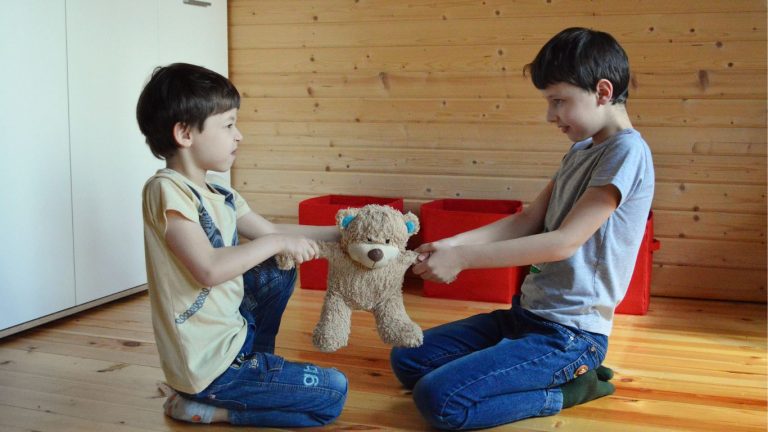The return to the school term routine presents a good time to reflect on how meal times in your household work. Here’s some of my key tips to making family meal time more meaningful.
The school term can be a frantic time for families, especially as children get older and they each get a number of after-school commitments.
At times it can seem like everyone is going in a different direction and you’re never all in one place at the same time.
Too often in our busy lifestyles it’s the family meal time that’s one of the first things to go, as we try to squeeze everything into our day.
If you never eat together as a family, or you always eat in front of the TV, consider making some positive changes to meal time routines in your family this year.
Making family meal time meaningful
Admittedly it can be hard to find time to eat together as a family, and it certainly may not be a realistic goal for every night.
Often older children have sports or work commitments, and little children may need to eat quite early. So it can be difficult to eat together as a family, especially if a parent is working late.
However, there are benefits to eating together as a family with no TV playing in the background.
Developing a family tradition of eating together at least one night a week is certainly not an impossible goal.
Family meal time benefits for young children
Developing this routine with very young children can at times seem fraught with problems, especially if you have a fussy eater. But it is worth the effort, and hopefully it shouldn’t be long before the zoo-like status of eating together is a distant memory.
Younger children benefit from seeing Mum or Dad eating a variety of foods. Teaching ‘by example’ is often one of the best ways of getting wee children to eat a variety of foods.
Serving a little of everything that’s on offer is important, even if they routinely avoid a certain food – remember it may take 10-15 presentations of a food before a young child will decide to try it.
Young children may not be able to sit still at the table for as long as older children. However, sitting down to share a meal together as a family is one way of teaching children to eat at the table instead of wandering around and snacking constantly.
If no adult is sitting with them, they’re more inclined to get distracted and leave the table.
Family meal time for teens
Maintaining the routine of family dinners is also really important for teenagers.
There is some evidence, based on studies in America, which indicate that teenagers who frequently partake in family dinners have better grades, less depression, are less likely to drink, smoke, or use marijuana, and less likely to have eating disorders compared to teens who only eat with their families less than twice a week.
A recent large national-based survey of 12-18 years olds in New Zealand also indicates that 40% of respondents wanted more time with one or both parents. The good old family dinner is one way to achieve this.
Family dinners are a great time for some interesting conversation.
It may feel like no ‘worthwhile’ conversation takes place for some dinners – you may feel that you spend more time encouraging wee ones to eat, while at the other end of the scale trying to elicit conversation from your teenager may seem impossible.
The more you eat together as a family the more it is a great opportunity to share in worthwhile conversation as a family.
It’s amazing what you can learn about your child’s day over dinner and in turn, it’s also a good opportunity for them to hear about your day – the ups and the downs!
Eating together and sharing conversation is another good way to show your child or children how much they’re valued and helps them to foster a sense of self worth.
You can actually increase your teenager’s social IQ by incorporating positive, thought-provoking and philosophical conversations into your meal time routine.
Nutrition and manners
There are nutritional benefits to eating together as a family as well.
Studies show that families who eat together make healthier food choices and in particular tend to have a higher amount of fruit and vegetables in their diet.
Families who eat together also tend to eat fewer takeaways, consequently having a lower fat diet and less processed foods.
It’s also a good time to model appropriate eating behaviour and manners.
Eating out is more common these days. No one wants to eat in a restaurant or café with children who have no idea how to stay seated and who have poor table manners.
So set the goal this year of establishing the routine of eating together as a family – once a week is a step in the right direction, but if you do it more often you will really start to see the benefits of family dinners.
6 tips to foster meaningful family meal times
- Try to identify which night is going to work best for your family.
- If you get tired working out what to cook each night let the children help choose the menu for that night, but do try to ‘negotiate’ a healthy choice! If the children have some input into the menu you are already on the way to a successful meal.
- It does not have to be elaborate – keep it simple; rotisserie chicken and salad with fresh crunchy bread, home-made hamburgers, stir fry with rice, pasta with smoked chicken and a tomato based pasta sauce.
- Get the children to set the table – my children love choosing the candles and often surprise me with fresh flowers from the garden on the table.
- Avoid any lecturing over the family meal. This should be a positive family time, so avoid disciplining for something that happened earlier on.
- Encourage the children to help with the food preparation – teaching cooking skills even at a young age has its benefits later on.
Date night – our cuisine Thursday!
On a personal note our family is lucky to enough to eat together most nights.
I suspect this is due mainly to the fact we both work from home, and at the moment our children are young and not heading out the door to evening sports practice or other commitments.
We treasure our family dinners, and I love the way my children never cease to amaze me with their little jokes or reflections on their day. It’s been a challenge at times to get our youngest to sit at the table, eat her meat and feed herself – but perseverance has paid off!
However, there’s another night I treasure just as much and that’s the night when my husband and I eat on our own without the children.
When our children were very young I struggled to find a baby sitter that I was comfortable with and, not having any family around that I could call on, we felt like we never really got out of the house together as a couple.
So almost 6 years ago we decided to put one night aside for ourselves, where we would sit down to a special meal just for us – this became known as ‘our cuisine Thursday’.
We feed the girls early and get them into bed. Friends and family soon learnt not to ring on a Thursday as it was our night of no interruptions.
6 years on the tradition is still going strong. What I really love about this night is that we take turns – one week I’m the cook, the other week my husband Donal cooks. We try to cook something new each week, and as a result we’ve tried lots of things we might not try with the girls.
What’s your family goal for meal times this year? Would you like to spend more nights together talking, rather than watching TV? Are you worried about your kids’ eating habits? Or do you love the idea of starting your own ‘dinner date night’ at your place?
Make this the year to making family meal time more meaningful at your place.
For great ideas on what to cook for family meal time, check out our Dinner recipe section. For more expert advice on meal times, check out our Health and wellbeing section.





